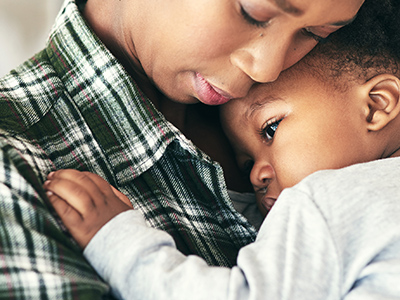Our Systems Meant to Help Are Hurting Black Families

Mandated reporting is meant to keep children safe. It requires that those who work with children—health professionals, social workers, and teachers, among others—report any reasonable suspicion of child maltreatment, and gives them the anonymity to do so freely. When done under appropriate circumstances, mandated reporting supports children’s social, emotional and physical health. But, sometimes interventions that are meant to help end up causing unintentional harm.
This is what happens when structural racism gets in the way of intended processes, says Erin Cloud, supervising attorney for The Bronx Defenders and a member of the Black Mamas Matter Alliance. In these instances, she explains, mandated reporting disrupts the health of black families, ultimately causing harm to the children that providers intend to protect. In honor of Black Maternal Health Week, and in keeping with our strategic vision’s focus on social determinants of health, NICHQ is shining a spotlight on this troubling example of when systems meant to support children’s health end up failing black mothers and children.
Cloud, who’s spent the past seven years advocating for parents in the child welfare system, shares the story of one of her clients, an example of what happens when biased reporting causes unintentional harm for mothers and children. The client’s story, and Cloud’s insight, offer a unique perspective on why mandated reporting is inextricably linked to children’s health outcomes.
Gloria’s Story
Gloria is a black mother of two children. When her second child was born, Gloria was living in safe shelter housing with her first child, a healthy 3-year-old boy. After undergoing a cesarean surgery, doctors chose to drug test both Gloria and her newborn son, Jermaine. This decision was made without notice or consent, and done despite the newborn being healthy at birth. The results of the test showed marijuana metabolite evident in both mother and baby. In response, the doctors immediately reported Gloria to child protective services (CPS). Of note, the health system’s guidelines in Gloria’s state do not recommend calling CPS at this point.
Gloria, despite just undergoing the trauma of cesarean surgery, was forced to participate in an hour-long interview. During this interrogation, Gloria was forthcoming that she smoked marijuana recreationally. When CPS then told Gloria that she could not take her child home from the hospital, Gloria was furious, brokenhearted and desperate for her baby. In frustration, she yelled at the caseworker. Because of this emotional outburst, she was reported as “rude,” “angry” and “uncooperative.”
Interested in hearing more from Black Maternal Health Week? Follow the discussion on Twitter with #BMHW18.
When Gloria returned to her shelter that night without her children, she was told that, unless she had her children, she would be forced to leave the shelter in three days. Gloria, who left the hospital in stitches, also had her 3-year-old taken away and now risked losing access to safe housing.
The next day, CPS concluded that the children would be unsafe in Gloria’s care due to her “angry outburst” at the hospital and admitted marijuana usage. Gloria begged for her children to stay with her sister but CPS declined the request, concluding that her sister’s home was too small. Instead, Gloria’s children were sent to live with strangers in a foster home.
Gloria then began a week-long hearing where she had to fight for her children’s return. During that time, both her health and her children’s health were put at risk. She was denied regular contact with her baby, and not even offered a breast pump to support future breastfeeding habits. The healthy 3-year-old she had raised was taken from her, despite there being no evidence of abuse.
By the hearing’s end, the Court agreed that Gloria was a fit mother and returned the children. By then, Gloria had lost her shelter. And, because of the initial report, Gloria’s name was placed on a child abuse registry that will restrict her employment options until Jermaine is 28 years old.
Loss of critical mother-child interactions, loss of housing and loss of employment. These are the actual consequences from a report that was intended to help.
